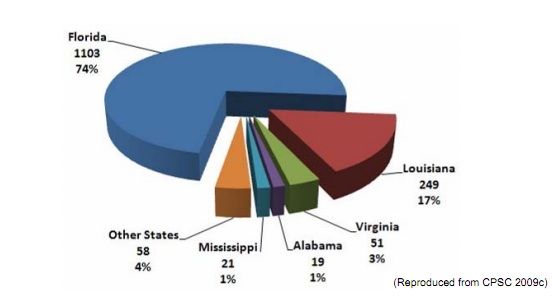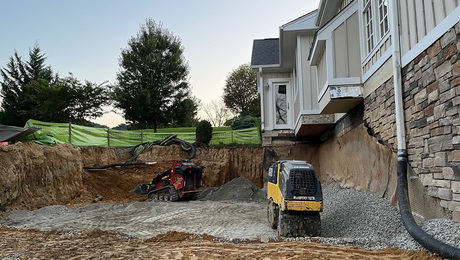
By the time the U.S. Consumer Product Safety Commission and its team of consultants and testers had completed their investigation of problem drywall imported from China during the building boom, the agency had heard complaints about the drywall from 3,905 homeowners in 42 states, the District of Columbia, American Samoa, and Puerto Rico.
The complaints focused on the drywall’s alleged off-gassing of compounds that, homeowners said, caused health problems, including respiratory ailments and headaches, and caused corrosion of metal components in the homes. Many people said the drywall also emitted a sulfurous, rotten-egg odor that rendered their homes almost uninhabitable. The CPSC estimates that as many as 6,300 homes are afflicted with the problem product.
Final guidance for homeowners, based on a study of 51 homes (41 “complaint” homes and 10 non-complaint homes) and issued by the CPSC on September 15, recommended a few relatively modest actions beyond the obvious – and, in many instances, financially impractical – step of replacing the drywall: (1) replacement of all smoke and carbon monoxide alarms; (2) replacement of electrical distribution components, including receptacles, switches, and circuit breakers (but not necessarily wiring); and (3) replacement of fusible-type fire sprinkler heads.
No research on possible long-term health problems
One striking thing about the CPSC investigation is that it never extensively researched homeowners’ claims of health problems related to the drywall. As noted in the CPSC summary released this month, the agency “requested that CDC (U.S. Centers for Disease Control and Prevention) consider undertaking a comprehensive study of any possible long-term health effects. In February 2011, CDC indicated that the best scientific evidence available at that time did not support undertaking a long-term health study.”
An FAQ on the CPSC website acknowledges homeowners’ complaints about health problems, but also notes that because “many consumers report that their symptoms lessen or go away when they are away from their home, but return upon re-entry, it appears that these symptoms are short-term and related to something within the home.” (Hey, they said it, not me.)
“The staffs of the CPSC and CDC,” the FAQ continues, “agree that the levels of sulfur gases detected in the affected homes in the 51-home study were at concentrations below the known irritant levels in the available scientific literature; however, it is possible that the additive or synergistic effects of these and other compounds in the subject homes could potentially cause irritant effects to consumers.”
Hydrogen sulfide and the humidity factor
Whatever health problems these airborne compounds might or might not have caused, they did in fact corrode more metal surfaces (particularly those containing copper and silver) in the study’s complaint homes than those in the non-complaint homes, researchers under the CPSC purview found. Concentrations of hydrogen sulfide were significantly higher in complaint homes, for example, and hydrogen sulfide concentrations in the air were associated with higher dew points for homes with imported drywall. “Hydrogen sulfide was present where the dew point reached typical room temperatures and condensation of water vapor would be expected,” a study summary noted.
In addition, the study showed that while hydrogen sulfide and formaldehyde concentrations in indoor air were associated with corrosion rates in the study homes, concentrations of aldehydes in the indoor air of both complaint and non-complaint homes did not differ significantly.
One positive outcome of all this is that the researchers involved now have ways to identify problematic drywall using a combination of Fourier transform infrared spectroscopy (FTIR) and X-ray fluorescence (XRF) analysis. The CPSC also noted that it continues to work with industry standards groups to develop better standards for drywall, and that ASTM International is pushing for a requirement that all drywall sheets be stamped with the manufacturer’s name, the production date, and the source materials used.
Fine Homebuilding Recommended Products
Fine Homebuilding receives a commission for items purchased through links on this site, including Amazon Associates and other affiliate advertising programs.

8067 All-Weather Flashing Tape

Affordable IR Camera

Reliable Crimp Connectors

The number and percentage of drywall complaints received as of September 2009.

























View Comments
(http://top4biz.com )
Online Store,Get Name Brand Fashion From 12USD Now!
Lv,Gucci,Prada,Coach,Chanel Women sandal is $30